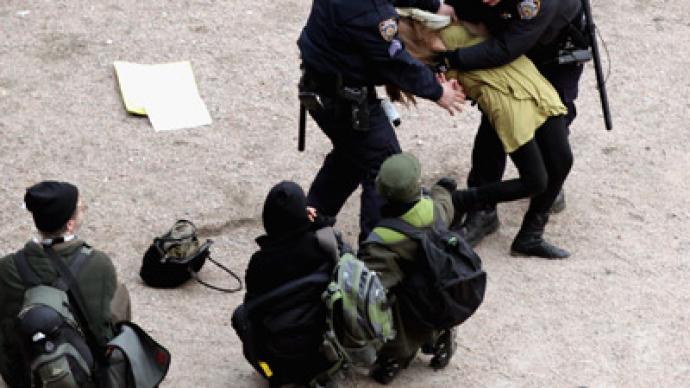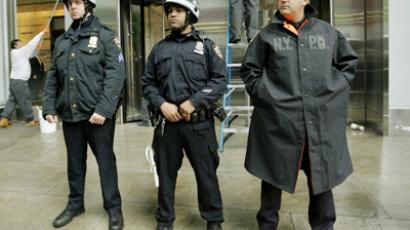Confirmed: NYPD used excessive force on ‘Occupy’ protesters

A group of legal experts have published a report which contains 130 cases that can be qualified as police brutality against Occupy Wall Street protesters in New York.
Researchers at NYU and Fordham University have concluded that NYPD officers acted beyond their powers during their intense crackdown against Occupy protesters. Findings from the eight-month study serve to validate months of claims that demonstrators were, in fact, mistreated by officers.The study found that police used batons, scooters, horses, and metal barricades to inflict unnecessary force and intimidation on demonstrators. But the barricades were not only used as barriers around encampments. According to the report, officers threw one protester so hard that she became “semi-airborne” before falling unconscious. An officer then shoved a barricade into her chest.In several instances, officers used pepper spray to disperse peaceful demonstrators. One protester alleged the NYPD used pepper spray to prevent her from videotaping an arrest.A citizen journalist quoted in the report remarked, “Physically attacking people with a chemical agent for no reason — when you have cops doing that, you don’t feel safe when you see cops.” Sarah Knuckey, an NYU law professor and key author of the report, told The Guardian, "All the case studies we collected show the police are violating basic rights consistently and the level of impunity is shocking.”NYPD officers organized late-night raids on peaceful encampments and made arbitrary arrests to peaceful protesters, bystanders, and journalists.Findings show that reporters covering the protests experienced harassment from officers, including restrictions on access and arbitrary arrests.
The report specifically mentioned that journalists were barred from covering the overnight eviction of protesters in Manhattan’s Zuccotti Park last November.“Our crews had a very difficult time moving around between 1am and 4am. Press passes seemed not to impress the cops on the scene,” said a journalist in the report.The findings come after researchers reviewed hours of video footage, documents, and press reports, and conducted interviews with protesters and witnesses."Many interviewees cried while speaking about their interaction with the police – they still carried a sense of trauma," Knuckey said.The report also found that there is now an ongoing effort to squash protests throughout the city, even when they are peaceful and pose no threat to the public.It’s the first in a series of studies which will examine authorities’ handling of the Occupy movement in five cities across the US, including Boston and Oakland.Authors concluded that police intimidation and force only served to escalate tensions between officers and protesters, while limiting the right to free speech and assembly. Knuckey told Reuters she hoped the US Justice Department would consider investigating the NYPD’s conduct if the city refused to do so. The authors of the report have now called for the creation of an independent inspector general to monitor the actions of the city’s police department.They also suggest authorities should launch an investigation into the NYPD’s handling of Occupy Wall Street demonstrations.The Occupy Wall Street movement began in New York 10 months ago, as a protest against corporate greed and corruption in the US. The campaign quickly went global, sparking encampments and demonstrations in major cities across the world.














